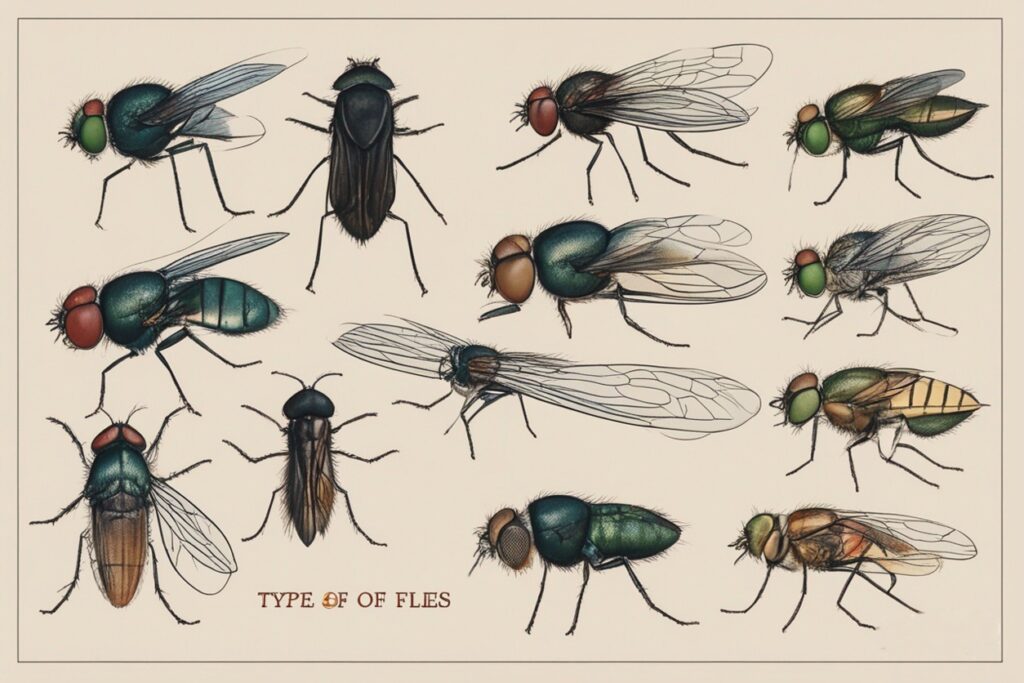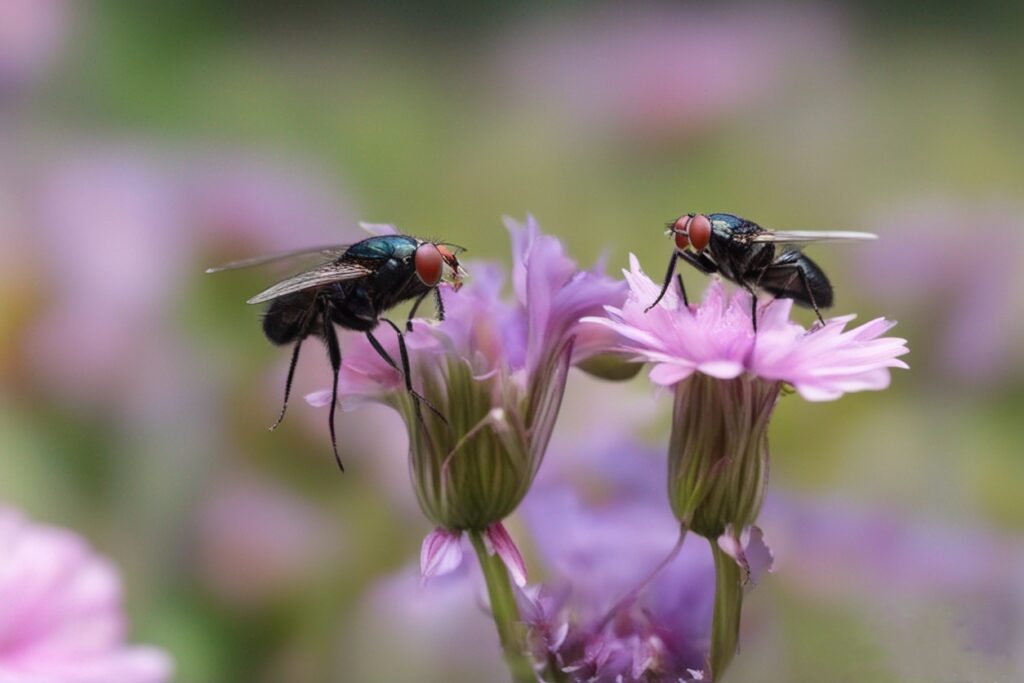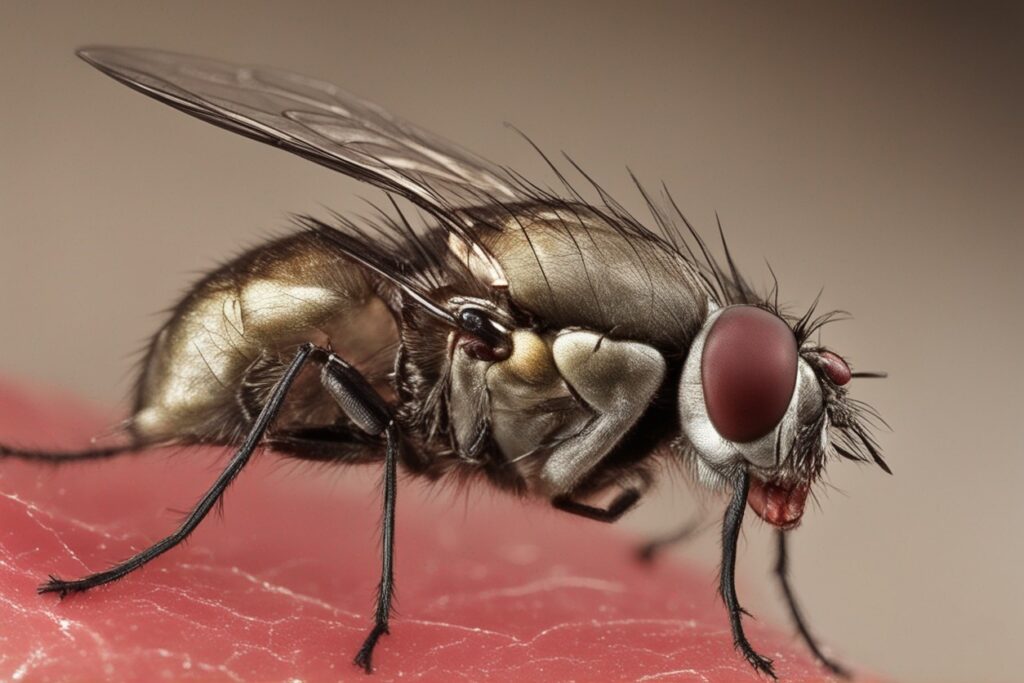Introduction
Have you ever been outdoors, enjoying a beautiful day, only to have your peaceful moment disrupted by a pesky fly landing on you? It’s a common and frustrating occurrence that leaves many of us wondering, “Why do flies land on me?” Let’s explore the reasons behind flies irritating behavior. We’ll uncover the science, biology, and some surprising facts about these buzzing insects that seem to have a peculiar fascination with humans.
Key Highlights
- There are different types of flies that land on humans and bother us a lot.
- Flies are attracted to us by our exhaled carbon dioxide, warmth, sweat, skin, oily hair, and certain body odors.
Type of Flies that Land on Human

There are several types of flies that are known to commonly land on or bother humans. Some different types of flies that often bother humans are:
- Houseflies (Musca domestica): These are the most common type of flies found in and around human habitations which Land on Human. They are attracted to food, garbage, and other organic materials.
- Fruit Flies (Drosophila melanogaster): Fruit flies are small, reddish-brown flies that are often found around ripe or fermenting fruits and vegetables.
- Stable Flies (Stomoxys calcitrans): These flies are similar in appearance to houseflies but can deliver painful bites to humans and animals. They are often found around livestock and areas with animal waste.
- Mosquitoes (Culicidae family): While not true flies, mosquitoes are a common insect that bothers humans by biting and potentially transmitting diseases.
- Black Flies (Simuliidae family): These small, black flies are known for their painful bites and are typically found near fast-flowing rivers and streams.
- Deer Flies (Chrysops spp.): Deer flies are larger flies that can deliver painful bites to humans and animals. They are often found in wooded areas and are most active during the summer.
- Sand Flies (Phlebotominae family): Sand flies are tiny flies that are known for transmitting diseases like Leishmaniasis. They are typically found in sandy or arid regions.
- Gnats: The term “gnat” is often used to refer to small, flying insects, including various species like fungus gnats and biting gnats, which can be annoying to humans.
- Cluster Flies (Pollenia spp.): These flies are often found in large numbers in homes during the fall and winter months, seeking shelter from the cold.
- Midges: Midges are small, mosquito-like flies that are often found near bodies of water and can be a nuisance to humans, especially in the evenings.
Why do Flies Land on Me
Flies, those tiny winged creatures, have a reputation for being attracted to humans. But what makes them choose us as their landing pad? Let’s unravel the mystery of ‘Why do Flies Land on Me’.
The Magnetism of Carbon Dioxide
Flies like to land on humans because we breathe out something called carbon dioxide. This happens when we exhale, which is just part of how we breathe. Flies have an incredible sense of smell, and they can smell this carbon dioxide even from far away. For flies, it’s like a sign that says, “There might be food or a warm place here.” So, when they sense our carbon dioxide, they come closer, thinking we could be a good place to find something to eat or a cozy spot to live. This is why flies often bother us – they’re naturally attracted to us because of our breath.
The Quest for Food
One of the primary reasons flies land on us is their relentless pursuit of food. Flies are opportunistic feeders, and our bodies offer an abundance of potential feasting grounds. They are particularly drawn to sweat, skin oils, and other bodily secretions. Flies are equipped with specialized sensory organs that can detect even the faintest traces of these substances.
The World of Scents

Flies are guided by their sense of smell. They are attracted to a wide range of scents, including the fragrances we wear. Perfumes, lotions, and even scented detergents can pique a fly’s interest. So, if you’ve ever wondered why a fly landed on you just after applying that lavender-scented lotion, now you know!
Heat and Warmth
Flies are ectothermic beings, which means they need warmth from their surroundings to control their body temperature. When you’re outdoors on a sunny day, your body radiates warmth, making you an attractive spot for a fly to perch. They seek out warm surfaces, and your skin becomes an ideal landing pad.
Reflections and Colors
Flies have compound eyes that can detect polarized light and reflections. They are often drawn to shiny or reflective surfaces. If you’re wearing something that glistens in the sunlight, a curious fly may mistake it for a potential food source and land on you.
Exploring How Flies make their Landings on Human
Now that we understand why flies might land on us, let’s delve into how they do it.
The Delicate Landing
Flies are incredibly agile insects. When they land on a surface, they do it with finesse. Their specialized leg structures, equipped with tiny claws and adhesive pads, allow them to grip onto surfaces securely. They can even land upside down, thanks to their remarkable acrobatic abilities.
Feeding Techniques
Once a fly has landed on you, it may engage in feeding behaviors. Flies have sponge-like mouthparts that can absorb liquids. They’ll use their proboscis to explore and try to feed on any available food sources, which may include tiny droplets of sweat or skin oils.
The Annoyance Factor

Now that we’ve uncovered the reasons behind ‘Why do Flies Land on human’, it’s essential to address the burning question: Why is it so annoying?
Disrupting Our Peace
Flies can be persistent and intrusive. Their constant buzzing and landing can interrupt our relaxation, outdoor activities, or even our meals. The annoyance factor is amplified when you’re trying to enjoy a quiet picnic or a day at the beach.
Disease Transmission
Apart from being annoying, flies can also pose health risks. Flies are recognized as carriers of different diseases and harmful microorganisms. When they land on you, they may transfer these harmful microorganisms, potentially leading to infections or illnesses.
Related Category Post: Why is it illegal to collect Rainwater?
FAQs
- Do flies land on everyone equally? Flies are attracted to various factors, so not everyone will experience the same frequency of fly landings.
- Can I prevent flies from landing on me? You can reduce the likelihood by using insect repellents and avoiding strongly scented products.
- Do flies carry diseases that can harm humans? Yes, flies can carry disease-causing pathogens, making it essential to maintain good hygiene and food safety practices.
- Why flies land on my food? Flies are drawn to food odors and are persistent in their search for nourishment.
- Are there any natural remedies to deter flies? Some natural remedies, like citronella candles and essential oils, may help repel flies, but their effectiveness can vary.
Conclusion
In conclusion, the next time a fly decides to land on you, you’ll have a better understanding of ‘Why do flies land on human?’. Flies are driven by their quest for food, attracted by scents, warmth, and reflective surfaces. While their landing can be annoying, it’s a reminder of the intricate world of insects that share our environment.
Remember, while flies can be a nuisance, they play a role in ecosystems by helping decompose organic matter. Understanding their behavior can lead to better ways to coexist with these tiny but often bothersome creatures.
So, if you ever wonder, “Why do flies land on me?” you can appreciate the complex interplay of biology and behavior that brings these tiny creatures into our personal space.



